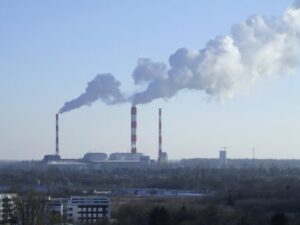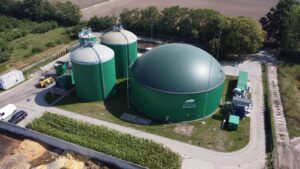Smog and air pollution are not so much caused by power plants and industry, but above all so-called low emissions, i.e. old domestic heating stoves and local coal-fired boilers. This sector is responsible for over 40 percent of total PM10 dust emissions in Poland, as well as 80% total emission without (a) pyrene B (a) P – results from the report by the Polish Electricity Committee on the smog and activities of the Polish energy sector to improve air quality, which inaugurated the information and education campaign „Energy sector loves clean air”.
– Smog is an important topic from the point of view of our health and the quality of the natural environment. The title is a bit controversial, but it also encourages some thoughts. With today’s meeting, we inaugurate a campaign that is informative and educational and we want to reach out with reliable information to an average citizen. We want the message to be credible and transparent – said Tomasz Kosiński, Director of the PKEE Office.
According to prof. dr hab. Andrzej Kraszewski from Warsaw University of Technology, low emission is responsible for smog in Polish cities. – Who is responsible? This is often measured and contested in Poland and especially in Polish cities? These are not big power plants. Behind the smog is responsible for low emissions, car transport but there are also other sources, eg secondary lift and inflow from outside. Energy is not a flower garden, but when it comes to smog in large cities, it is not the main perpetrator – he said.
As dr. Janusz Zyśk from the AGH University of Science and Technology in Krakow said, mainly households, which are also classified as low-emission are responsible for poor air quality. According to the report „Assessment of air quality for Poland in 2015”, the main reason for exceeding the permissible levels of PM10 and PM 2.5 was the impact of emissions associated with individual heating of buildings. In this context, he mentioned the recently introduced so-called anti-smog tariffs that offer access to cheaper energy for customers who give up burning low-quality fuels in their home furnaces for heating with electricity. – It can be one of the solutions that affect the reduction of low emissions – said the expert.
During the speech, Dr. Zyśk drew attention to the decrease in emissions generated by the energy sector. – In 1990-2015, emission reduction of all dust fractions by 95% took place in this sector. During this time, emissions from transport increased, which is the effect of an increasing number of cars – he said. He emphasized that pollutant emissions in the energy sector are strictly controlled and the emitted flue gas must meet the standards set out in, among others, in emission standards for dust in the energy sector. In comparison with 2005 to 2021, the emission of dust from coal-fired power plants will fall nearly by 18 times.
As we read in the PKEE report at the end of the heating period, the Committee wants to issue a „Bill for SMOG” where it will show who is responsible for the smog and will convince you to solutions beneficial both from the financial side and above all for the natural environment.
The Committee wants to convince as many people as possible to switch to cheaper and healthier alternatives to heating for heating homes with old furnaces. In addition, it will prepare and conduct a series of debates addressed to local communities in Polish cities and towns. – We are going to put a lot more emphasis on education. We need to raise awareness – said Dr. Eng. Andrzej Sikora, president of the Institute of Energy Studies.
Actions that are and will be undertaken for clean air and for the fight against smog should be undertaken jointly at three levels – government administration, local government and energy companies. We would like to find out with the message that the power industry has been taking, taking and will take all available measures to improve the air quality in Poland. Nobody is perfect. Perhaps those attempts that have been made so far have not been effective, but the proposed solutions, eg anti-smog tariffs or the expected regulation on fuel quality are steps in the right direction. The industry will make every effort on its part to ensure clean air.








